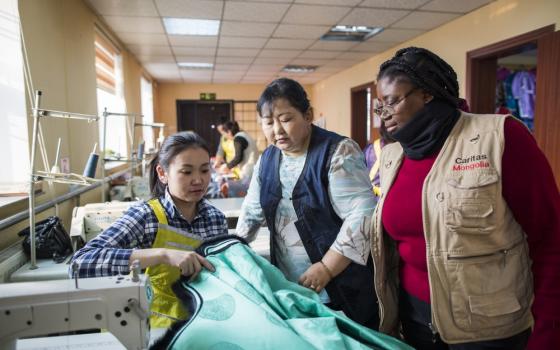When I received my mission assignment letter for Outer Mongolia in 1998, I felt darkness had covered me. I was full of grief and anger, and I wondered, "Why Mongolia?" which was my second choice, and not Guatemala, my first choice. I had even started taking Spanish lessons in Cameroon!
I met one of my community sisters who had been a missionary in Cameroon for over 30 years, and I poured out my grief. Her advice to me was to pray over it and allow the will of God to work through me. I prayed that God who chose me for his mission would help me get through this experience.
In the jubilee year 2000, I set out on my missionary journey to the unknown land of Chinggis (Genghis) Khaan — Outer Mongolia. When my plane landed at the Chinggis Khaan International Airport, and I walked through immigration where they spoke barely a few words in English, I felt lost and wondered how it would be.
At the airport my sisters, the parish priest, and some youth from the parish were waiting, and I felt welcomed. But coming from the populated Cameroon capital of Yaoundé, seeing the scanty population here let me know it was going to be tough.
My first initiation was with Mongolian vodka, of which I had to drink three "shorts." This was followed by a big bowl of "airag," fermented mare's milk. The strong smell of horse was terrible, but I felt I had to drink it in deference to the culture; they insisted, and I couldn't say no. I struggled to empty the bowl and felt like throwing up. I also had a headache and a stomachache but couldn't express it since I knew nothing of the language.
While still struggling to come to terms with the airag, I was served another big bowl of milk tea with salt, accompanied by a big plate of mutton dumplings called "buuz." Of course they said I had to finish everything to make the family happy.
This is the way I celebrated my first Tsagaan Sar, or the weeklong celebration of the Lunar New Year — I became sick. That was my first year; in the following years, I knew how to deal with it. I had to learn the hard way.
Another memorable experience was in 2001. I set out to Zavkhan Province, situated 975 km from Ulaanbaatar, for a month of enculturation with a Buddhist priest's family. We traveled long kilometers across the steppes without seeing anyone, not even the "gers" or traditional Mongolian tents.
After traveling a whole day, we had to spend the night in a Russian jeep, with 10 of us packed like sardines. The night was very cold. My muscles cramped because I was unable to straighten out my legs; but we had no choice but to rest after the long trip.
Early in the morning the next day, we continued our trip. When we came to a stream we had to drive across, we stopped and washed our faces before continuing our journey. After another 200 km, we finally reached our destination. The 10 of us were welcomed into a small ger where we all had to sleep.
There were two beds: I was given one of them and the grandpa slept on the other, while the other eight people had to lie on thin mattresses on the floor.
The next problem was how to change into my night clothes; everyone else stood up and just stripped — both men and women alike. I waited for everyone to go to bed so I could change, but they stayed up late and since I was very tired I fell asleep.
Another beautiful memory: I am someone who laughs really loud. While I was living with the family, the grandpa would always remind me that a woman doesn't laugh loud. This was very difficult for me — just to smile instead of laughing. It became a heavy burden for me, and I had to go far up the mountain to laugh loud and express my emotions.
Since everyone was used to eating lots of meat and flour with only a few carrots, turnips or cabbage, after a few days I suffered terrible constipation. Our neighbor gave me lots of yoghurt to eat, telling me that it would help — to no avail.
I was "adopted" by the family and whenever there was any national celebration, I always received my share of the beef shared by grandpa with all his children. The whole month of August that year was very memorable in my missionary life, for a firm foundation was laid for the rest of my years in Mongolia.
In 2002, I was teaching young Mongolians and enjoying the collaboration with the Mongolian teachers and the other foreigners in our language school. We prepared many young people, who appreciated the work done in those years. Most of them have benefitted from their education, which is a source of real joy for me.
Later I worked with the Verbist Care Center, a center for street children, mostly orphans who had lost one or both parents, some of whom had been physically abused. It was a very challenging but enriching experience to accompany them in their journey toward becoming responsible adults, and to see them graduate and have a job and a happy family — what any parent would love to see for their children.
That was my joy as a young missionary. There were times when I felt all my efforts were in vain, but when one of the children succeeded it was like a spark of light in my darkness.
Since 2012, I have been working with the Caritas Mongolia Skills Training Center to provide short-term practical training for poor and vulnerable men and women in Ulaanbaatar's ger areas. Most of the trainees are recent internal migrants without the skills to find decent employment in the capital city Ulaanbaatar. They learn to produce handicrafts, clothing and other sellable items.
Another challenge we faced was the long winter. I had to travel by bus for 12 km to the Skills Training Center. When the bus had a breakdown, we had to stand out in the freezing cold (40 degrees below zero Celsius) with frozen toes and fingers. We were very happy to find a warm place to thaw out our limbs. At times like that, fire plays a very important role in reviving the body!
All these different experiences have helped shape my missionary journey with all these marginalized children, men and women. We journey together to find the glimpse of light in the darkness, where most of them have recovered their dignity, are employed, taking care of themselves, and living happily with their families.
This is a great joy for a missionary who cannot openly talk about her faith, but only about the unconditional love of God throughout her life. The person I was at the beginning of my missionary life has been shaped by the many different named and unnamed experiences on my journey. In all these, God is that glimpse of light in my dark moments.
[Lucilla Abemwe Munchi is a Missionary Sister of the Immaculate Heart of Mary, originally from Cameroon. She serves in Outer Mongolia, starting in 2000 before final profession in 2005; she directed an English language center, a shelter for street children and now supervises a program of Caritas Mongolia.]

